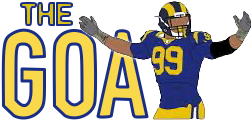See also: Washington Redskins mascot controversy and Redskin
Some consider the namesake and logo of the Washington Redskins insensitive towards American Indians.[58] There have been movements by certain groups to change the name,[59] but the attempts have been unsuccessful. Others make the case in defense that the Redskins name is intended to honor the bravery and dignity of American Indians and that, regardless of past usage, the word redskins today refers to the football team. Notwithstanding the protests of activists, a 2002 poll commissioned by Sports Illustrated found that 75% of those American Indians surveyed had no objection to the Redskins name.[60] The results of the poll have been criticized by American Indian activists due to Sports Illustrated's refusal to provide polling information (i.e. how participants were recruited and contacted, if they were concentrated in one region, if one ethnic group is over represented and the exact wording and order of questions).[61][62] But in 2004, a poll by the Annenberg Public Policy Center at the University of Pennsylvania essentially confirmed the prior poll's findings, concluding that 91% of the American Indians surveyed in the 48 states on the mainland USA found the name acceptable and setting out in detail the exact wording of the questions.[63]
In 1992, a group of American Indians led by Suzan Harjo filed Harjo et al v. Pro Football, Inc. to have the United States trademarks associated with the Redskins name cancelled under statutes which prevent registration of disparaging terms. The Trademark Trial and Appeal Board in 1999 ruled in favor of the petition and cancelled the trademarks. Following appeals, in 2005 the D.C. Court of Appeals in Pro-Football, Inc. v. Harjo reversed the cancellation, ruling that there was insufficient evidence to support the finding of disparagement and holding that the majority of the petitioners were barred by laches from maintaining the suit.[64] Had the cancellation of the trademark been successful, the team could have still used the name, and it still would have had enforceable trademark rights under state and local law. It would thus have been able to prevent others from using its marks on promotional goods, such as jackets and caps. It would, however, have lost various benefits of federal trademark registration, such as the ability to enlist the aid of the U.S. Customs Service to seize infringing imports at the border. On May 15, 2009, the U.S. Court of Appeals for the D.C. Circuit affirmed an earlier ruling that the American Indians had waited too long to challenge the trademark. The trademark was registered in 1967. American Indians successfully convinced the court to reconsider based on the fact that one of the plaintiffs, Mateo Romero, was only 1 year old in 1967 and turned 18 in 1984. The court decision affirmed that, even accepting the 1984 date, the American Indians had still waited too long for the 1992 challenge.[65] In November 2009, in Harjo v. Pro-Football, Inc., Case No. 08-327, the U.S. Supreme Court declined certiorari and refused to hear the Indian group's appeal.






